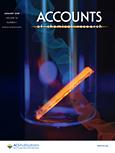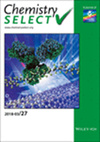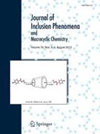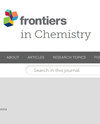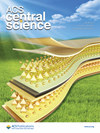K-THEORY
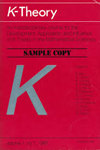
- 簡(jiǎn)稱:DALTON T
- 期刊ISSN:1477-9226
- 大類研究方向:化學(xué)
- 影響因子:0
- 是否OA:No
- 出版地:ENGLAND
- 年文章數(shù):1796
- 小類研究方向:化學(xué)-無機(jī)化學(xué)與核化學(xué)
- 審稿速度:約2.0個(gè)月
- 平均錄用比例:較難
官方網(wǎng)站:http://pubs.rsc.org/en/journals/journalissues/dt
投稿網(wǎng)址:http://mc.manuscriptcentral.com/dalton
K-THEORY
英文簡(jiǎn)介Dalton Transactions is a journal for all areas of inorganic chemistry, which encompasses the organometallic, bioinorganic and materials chemistry of the elements, with applications including synthesis, catalysis, energy conversion/storage, electrical devices and medicine. Dalton Transactions welcomes high-quality, original submissions in all of these areas and more, where the advancement of knowledge in inorganic chemistry is significant. Specific guidance for some areas of our scope is given below.Solid-state inorganic materials (including nanomaterials): We encourage work in the area of solid-state, materials and nano-chemistry that includes a significant inorganic chemistry component. Contributions could include the synthesis, characterisation, and applications of new inorganic or inorganic-organic hybrid solids, together with studies of their properties. However, studies of properties of known compounds are only encouraged if there is a clear advance in the inorganic chemistry, and where this forms a major component of both the novelty and significance in the paper.Catalysis: Studies that utilize well-characterized inorganic and organometallic compounds as catalysts for chemical transformations are welcome but must emphasize the advancement of knowledge in inorganic chemistry. This would include catalyst design and synthesis, structure-activity relationships and/or mechanistic studies. Work reporting new catalysts for well-studied reactions must contextualize the reported results within the state-of-the-art to demonstrate impact and advancement. Studies that generate ill-defined species in situ and/or report tables of catalytic data without appropriate comparison with existing catalysts will not be considered at Dalton Transactions.Bioinorganic and medicinal inorganic chemistry: We welcome work on model compounds of metalloenzymes and biologically active inorganic compounds, including reports on their synthesis, characterization and studies of their applications. Spectroscopic or computational work on metalloenzymes, or pure biochemical, biological, or biomedical studies on inorganic compounds are only encouraged if they clearly relate to specific properties of the metals or metalloid elements involved, and significantly further our understanding of inorganic chemistry. The same applies to papers related to the sensing and visualization of biorelevant metal ions. Such work is expected to have its focus on inorganic aspects and must completely characterize the inorganic compounds involved.Theoretical and computational studies: We welcome studies that report new models of reactivity, selectivity, bonding or structure, or new computational methods, that have relevance for the design of subsequent experiments. This is most clearly demonstrated by the description of testable predictions derived from the results of the reported theoretical work; the tests of these predictions could be contained in the same paper in which the predictions are described. Computational research that merely reproduces experimental data is not normally suitable for Dalton Transactions.
K-THEORY
中文簡(jiǎn)介道爾頓學(xué)報(bào)是無機(jī)化學(xué)的所有領(lǐng)域的期刊,包括有機(jī)金屬、生物無機(jī)和材料化學(xué)的元素,應(yīng)用包括合成、催化、能量轉(zhuǎn)換/儲(chǔ)存、電氣設(shè)備和醫(yī)學(xué)。道爾頓學(xué)報(bào)歡迎在所有這些領(lǐng)域以及更多領(lǐng)域提交高質(zhì)量的原始材料,在這些領(lǐng)域中,無機(jī)化學(xué)知識(shí)的進(jìn)步是重要的。下面給出了我們范圍內(nèi)某些領(lǐng)域的具體指導(dǎo)。固態(tài)無機(jī)材料(包括納米材料):我們鼓勵(lì)在固態(tài)、材料和納米化學(xué)領(lǐng)域開展工作,其中包括重要的無機(jī)化學(xué)成分。貢獻(xiàn)可能包括新的無機(jī)或無機(jī)-有機(jī)雜化固體的合成、表征和應(yīng)用,以及對(duì)其性質(zhì)的研究。然而,只有在無機(jī)化學(xué)有明顯進(jìn)展的情況下,才鼓勵(lì)對(duì)已知化合物的性質(zhì)進(jìn)行研究,而這是本文新穎性和重要性的主要組成部分。催化:利用具有良好特征的無機(jī)和有機(jī)金屬化合物作為化學(xué)轉(zhuǎn)化催化劑的研究是受歡迎的,但必須強(qiáng)調(diào)無機(jī)化學(xué)知識(shí)的進(jìn)步。這將包括催化劑設(shè)計(jì)和合成、結(jié)構(gòu)-活性關(guān)系和機(jī)械研究。報(bào)告研究良好反應(yīng)的新催化劑的工作必須將報(bào)告的結(jié)果與最新技術(shù)結(jié)合起來,以證明其影響和進(jìn)步。在道爾頓學(xué)報(bào)中,未與現(xiàn)有催化劑進(jìn)行適當(dāng)比較而在現(xiàn)場(chǎng)生成不明確物種和報(bào)告催化數(shù)據(jù)表的研究將不予考慮。生物無機(jī)和藥用無機(jī)化學(xué):我們歡迎金屬酶模型化合物和生物活性無機(jī)化合物的研究,包括它們的合成、表征和應(yīng)用研究報(bào)告。只有當(dāng)它們與所涉及的金屬或類金屬元素的特定性質(zhì)明確相關(guān),并且顯著加深了我們對(duì)無機(jī)化學(xué)的理解時(shí),才鼓勵(lì)對(duì)金屬酶的光譜或計(jì)算工作,或?qū)o機(jī)化合物的純生化、生物或生物醫(yī)學(xué)研究。這同樣適用于與生物相關(guān)金屬離子的傳感和可視化相關(guān)的論文。這類工作預(yù)計(jì)將重點(diǎn)放在無機(jī)方面,必須完全描述所涉及的無機(jī)化合物。理論和計(jì)算研究:我們歡迎報(bào)告反應(yīng)性、選擇性、鍵合或結(jié)構(gòu)的新模型或新計(jì)算方法的研究,這些模型與后續(xù)實(shí)驗(yàn)的設(shè)計(jì)相關(guān)。從報(bào)告的理論工作的結(jié)果中得出的可測(cè)試預(yù)測(cè)的描述最清楚地證明了這一點(diǎn);這些預(yù)測(cè)的測(cè)試可以包含在描述預(yù)測(cè)的同一篇論文中。僅僅復(fù)制實(shí)驗(yàn)數(shù)據(jù)的計(jì)算研究通常不適合道爾頓交易。
K-THEORY
中科院分區(qū)| 大類學(xué)科 | 分區(qū) | 小類學(xué)科 | 分區(qū) | Top期刊 | 綜述期刊 |
| 化學(xué) | 2區(qū) | CHEMISTRY, INORGANIC & NUCLEAR 無機(jī)化學(xué)與核化學(xué) | 2區(qū) | 否 | 否 |
K-THEORY
JCR分區(qū)| JCR分區(qū)等級(jí) | JCR所屬學(xué)科 | 分區(qū) | 影響因子 |
| Q1 | CHEMISTRY, INORGANIC & NUCLEAR | Q1 | 4.569 |
K-THEORY
中科院JCR分區(qū)歷年趨勢(shì)圖K-THEORY
影響因子精選同類領(lǐng)域期刊,熱門推薦輕松get~
-
- ACCOUNTS OF CHEMICAL RESEARCH
- 期刊ISSN:0001-4842
- 大類研究方向:化學(xué)
- 影響因子:24.466
- 數(shù)據(jù)庫(kù)類型:SCI/SCIE
- 咨詢投稿
-
- ChemistrySelect
- 期刊ISSN:2365-6549
- 大類研究方向:化學(xué)
- 影響因子:2.307
- 數(shù)據(jù)庫(kù)類型:
- 咨詢投稿
-
- JOURNAL OF INCLUSION PHENOMENA AND MACROCYCLIC CHEMISTRY
- 期刊ISSN:1388-3127
- 大類研究方向:化學(xué)
- 影響因子:
- 數(shù)據(jù)庫(kù)類型:
- 咨詢投稿
-
- Frontiers in Chemistry
- 期刊ISSN:2296-2646
- 大類研究方向:化學(xué)
- 影響因子:5.545
- 數(shù)據(jù)庫(kù)類型:
- 咨詢投稿
-
- Topics in Current Chemistry
- 期刊ISSN:2365-0869
- 大類研究方向:化學(xué)
- 影響因子:8.905
- 數(shù)據(jù)庫(kù)類型:
- 咨詢投稿
-
- ACS Central Science
- 期刊ISSN:2374-7943
- 大類研究方向:化學(xué)
- 影響因子:18.728
- 數(shù)據(jù)庫(kù)類型:
- 咨詢投稿
精選常見問題,答疑解惑輕松get~
- 三篇ssci論文怎么同時(shí)投出去
- 中文核心和sci哪個(gè)影響力更大
- 中科院一區(qū)和JCR一區(qū)期刊占比區(qū)別
- 發(fā)ssci如何快速找合適的期刊
- 資源保護(hù)方面論文投sci指導(dǎo)
- 外貿(mào)行業(yè)論文發(fā)ssci周期長(zhǎng)嗎
- 國(guó)外的sci投到錄用一般多久
- ssci期刊國(guó)內(nèi)認(rèn)可度
- 核能應(yīng)用論文翻譯英文發(fā)sci容易的方法
- 人口老齡化研究論文符合ssci領(lǐng)域嗎
- sci開源和不開源分別是什么意思?有什么影響?
- ssci發(fā)表是高水平學(xué)術(shù)論文嗎
- 生態(tài)修復(fù)主題英文論文會(huì)收錄哪些數(shù)據(jù)庫(kù)
- 哲學(xué)專業(yè)論文發(fā)英文期刊
- 中科院sci四個(gè)區(qū)的劃分
- ssci期刊和sci期刊的區(qū)別
- ESCI和SCIE要分清
- ssci送審論文多久出結(jié)果
- ssci論文二作有用嗎
- 水土保持類英文期刊好選嗎
- ssci期刊論文一定會(huì)檢索嗎
 投稿咨詢
投稿咨詢

